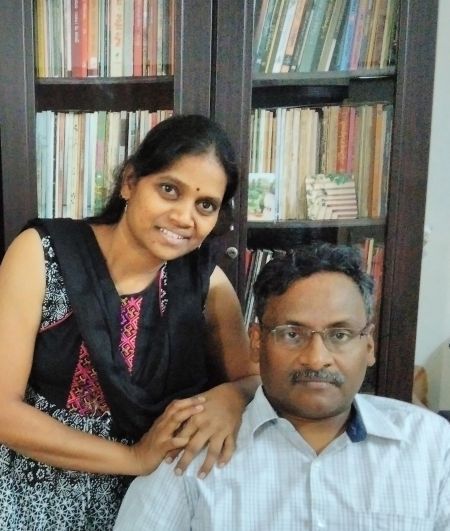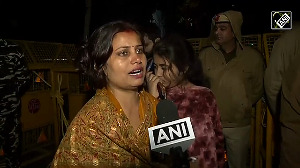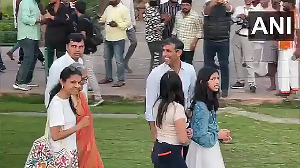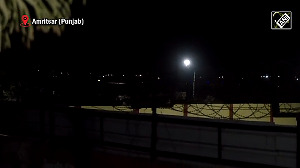 'How can we be silent when we see millions of Adivasis being displaced? Do we have a choice whether to speak or not?'
'How can we be silent when we see millions of Adivasis being displaced? Do we have a choice whether to speak or not?'
'My treatment this time was worse. Last time at least they didn't deny me medicines; those bought from outside were given to me. This time, even medicines bought at my expense were not given to me.'
'The most surprising part was that they refused even to take me to the jail hospital. Yet, when I moved the Supreme Court for bail, they filed an affidavit saying that they were treating me in three hospitals.'
Out of Nagpur jail's high security anda cell for the second time in nine months, Delhi University Professor G N Sai Baba, charged under the infamous Unlawful Activities (Prevention) Act for alleged Maoist links, speaks to Jyoti Punwani about his experiences in jail.
The professor is 90 per cent disabled and is wheelchair-bound. He explains why he chooses to continue paying an unbearable price for speaking out about the Centre's policy on Adivasis.
Did you expect to be back in jail so soon?
No, never. I am mystified by the court's order asking that my interim bail be cancelled and I be arrested within 48 hours.
The timing of the order was also such that I could do nothing. We got the order at 5.30 pm. It was the last working day of the high court before the Christmas vacation, and also the last day for accepting applications for the vacation bench.
Your treatment was terrible the first time. Was it better this time?
It was worse. Last time at least they didn't deny me medicines; those bought from outside were given to me. This time, even medicines bought at my expense were not given to me.
The last time, they respected the Supreme Court's order to take me to hospital. This time, when they didn't take me to hospital, I got a fresh order from the sessions court in January. That was not implemented.
When we reported that to the court, the judge personally came and met me in my cell and passed instructions that I be taken to hospital.
Even then his orders were not implemented.
When we reported this to the judge, he summoned the jailors through video conferencing, and directed them to shift me to the hospital. Again, his order was disobeyed.
Finally, he said he had done everything possible and advised me to approach the high court.
Even in terms of food, the treatment was worse. Last time, taking note of the fact that I can't digest jail food, they were giving me bland dal. This time, they refused even that.
When they saw I was sinking, they started giving me 100 ml of milk. Earlier, in accordance with the diet given by the hospital, I was given 400 ml of milk.
The most surprising part was that they refused even to take me to the jail hospital.
Yet, when I moved the Supreme Court for bail, they filed an affidavit saying that they were treating me in three hospitals, including a corporate hospital, and were paying huge amounts.
They also said if I'm released on bail, I would go underground. I've never missed a class in 25 years.
You were arrested in December. Nagpur gets very cold. Did that affect you?
Nagpur was very cold when I was arrested and very hot when I was released. Yet, they refused to give me an extra blanket.
Didn't all this make you lose hope?
I was hopeful that the Supreme Court would give me bail.
How did you survive?
Two Adivasi boys who had been with me in the anda cell last time, and been shifted to the general barracks, volunteered to help me. They took care of me all the time.
After a month of my arrest, one of them got acquitted of all charges and was released. But another tribal who was newly arrested took his place. Now, the second boy who was earlier with me is also going to be released.
These Adivasis from Gadchiroli had 15 cases against them. They spent four years in jail before they were acquitted in all of them.
Earlier, you could teach Adivasis English, and learn Urdu while in jail. Could you do any of that this time?
Well, by the time I came out now, one of them, who was more consistent, could read English newspapers. But this time, I could not do much. I was in great pain.
I had been arrested when I was in the middle of my medical treatment. With the stoppage of treatment, one by one, all my organs relapsed.
I had to travel to Gadchiroli, 400 kms away, 19 times in these three-and-a-half months.
Could your family meet you?
I was kept more isolated this time. Even my lawyers weren't allowed to meet me. As for meetings with my wife -- earlier, one guard used to sit in the room, but at a distance. This time, between her chair and my wheelchair, two officers would stand.
We could barely see each other through the space between these officers. The situation was impossible. We couldn't even talk in the 20 minutes she was there. Also, they ordered us to speak in Hindi. We refused.
So this time, in the three-and-a-half months that I was inside, she came just once. Last time, in my 14 months' imprisonment, she had come more than 10 times.
Do you know why the treatment was harsher this time? Had you done anything while you were out on bail?
I was out for five-and-a-half months, of which three-and-a-half were spent in hospital. The remaining two months I rested at home. I didn't attend any public meeting though I had been invited by students. Doctors refused to allow me to move out.
I could not teach, nor even write. What crime could I have committed to infuriate them?
One judicial decision orders your immediate re-arrest, another sets you free. How do you view the judiciary?
I am helpless. All I can say is that everyone was hopeful about the Supreme Court, and our faith was vindicated.
Your medical treatment was in full swing when you were re-arrested. What is your physical condition now?
Almost everything has relapsed. I don't know now if the damaged muscle and nervous system of my left hand can recover now. When I was released last time, it was critical. Three hospitals had tried to revive it. But now, I can't even move it.
What about your finances?
I am getting half my salary, which is going towards paying my loan. As for the rest, my family is running on donations from friends. My medical expenses fortunately were paid by Delhi University.
How has this impacted your daughter and your mother?
Very badly. My mother could not take my imprisonment a second time. Her health has deteriorated, she has been the worst affected.
My daughter is obviously affected, but she supports me. She attends all protest programmes held for me.
After all this, don't you feel like giving it all up? You've paid a heavy price for your outspoken dissent. You would be forgiven if you kept quiet. After all, there are many others still fighting.
But will I forgive myself? How can any democratic-minded person not speak out against the genocide of Adivasis?
How can we be silent when we see millions of Adivasis being displaced? Do we have a choice whether to speak or not?
IMAGE: Professor G N Sai Baba with his wife Vasantha Kumari.











 © 2025
© 2025